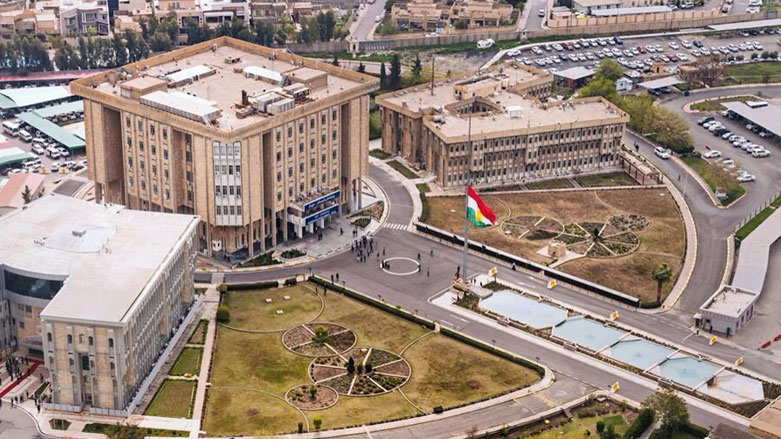Kurdish female MPs denounce blackmail attempt on fellow lawmaker
Female lawmakers in the Kurdistan Region Parliament on Wednesday denounced the alleged attempted blackmail of one of their colleague, with explicit videos recorded without her consent in a bugged apartment.

ERBIL (Kurdistan 24) – Female lawmakers in the Kurdistan Region Parliament on Wednesday denounced the alleged attempted blackmail of one of their colleague, with explicit videos recorded without her consent in a bugged apartment.
In an extraordinary press briefing just outside the legislature’s building, Shadi Nawzad, a female MP with the newly-established New Generation Movement (NGM), came forward with her story, claiming followers of her party’s leader were behind the sordid act.
Recently, leading members of NGM have directed sharp criticism against the party’s founder and leader, wealthy businessman Shaswar Abdulwahid, for what they say is a culture of cronyism and favoritism that has engulfed their movement.
Nawzad was among half of the party’s lawmakers—which holds a total of 12 seats in the Iraqi and Kurdistan parliaments, eight being in the latter—who endorsed the rebuke of Abdulwahid.
“Await the release of your nude film,” Shadi Nawzad first claimed a message she received from an unknown mobile number read. She later sent a screenshot of the purported one-sided exchange that included two posts. The first was an almost three-minute-long video—which had been blurred by Nawzad—and the second was the threat itself. She also announced her plans to sue the party leader.
In overwhelming support for their colleague, female lawmakers in the Kurdistan Region Parliament and the body’s human rights committee issued separate statements, calling for justice for Nawzad.
“We as parliamentarians, regardless of political and ideological beliefs and opinions, strongly condemn the threats and support Shadi Khan,” a statement signed by 17 MPs from the Kurdistan Region parliament released shortly after Nawzad’s initial briefing read. Thirty-six out of the legislature’s 111 seats are female.
“We hope these cowardly intimidations of women are put to an end,” the statement said, further calling on the region’s court to “punish all those people who threaten the progress of Kurdish women’s civil [rights] struggles.”

In a separate statement, the legislature’s human rights committee also backed Nawzad in her case, affirming: “for the elimination of such phenomenon, we hope our courts uphold the rule of law.”
The practice of extortion and blackmail of women in the region has become especially prevalent with the advent and widespread use of social media platforms, where young women fall victims to such crimes and, fearing social backlash and familial abuse, cow to increasingly taxing demands.
The Kurdistan Region has taken steps to end the phenomenon, but social risks and disincentives continue to keep many women and girls silent. Despite this, some still seek legal justice and file complaints with the police.
Nawzad’s coming out in such a public manner could prove a significant social development and trigger other women to take action to break with society’s norms, shaming, and restrictions on their freedoms.
Indeed, speaking to Kurdistan 24, this possibility was expressed by an activist who has been an outspoken women’s rights activist and a staunch promoter of campaigns to end the brutal practice of female genital mutilation (FGM)—one of the more sinister ways the repression of girls continues in the region.
Arayish Barzinjee-Martsch commended Nawzad for coming out and lamented how women continue to be controlled by means of intimidation.
“I’m proud of her for not staying quiet,” she said. “Unfortunately, men (particularly in authoritative positions) have been using this tactic with women for a very long time.”
Nawzad exposing the ploy to silence her with “threats and intimidation tactics is a very big step for a woman to take here with our social taboos,” and could “even endanger her life with the men in her own family if they are influenced by the social norms against our women here.”
“This would definitely be a milestone for women’s rights in this region.”
Editing by Nadia Riva